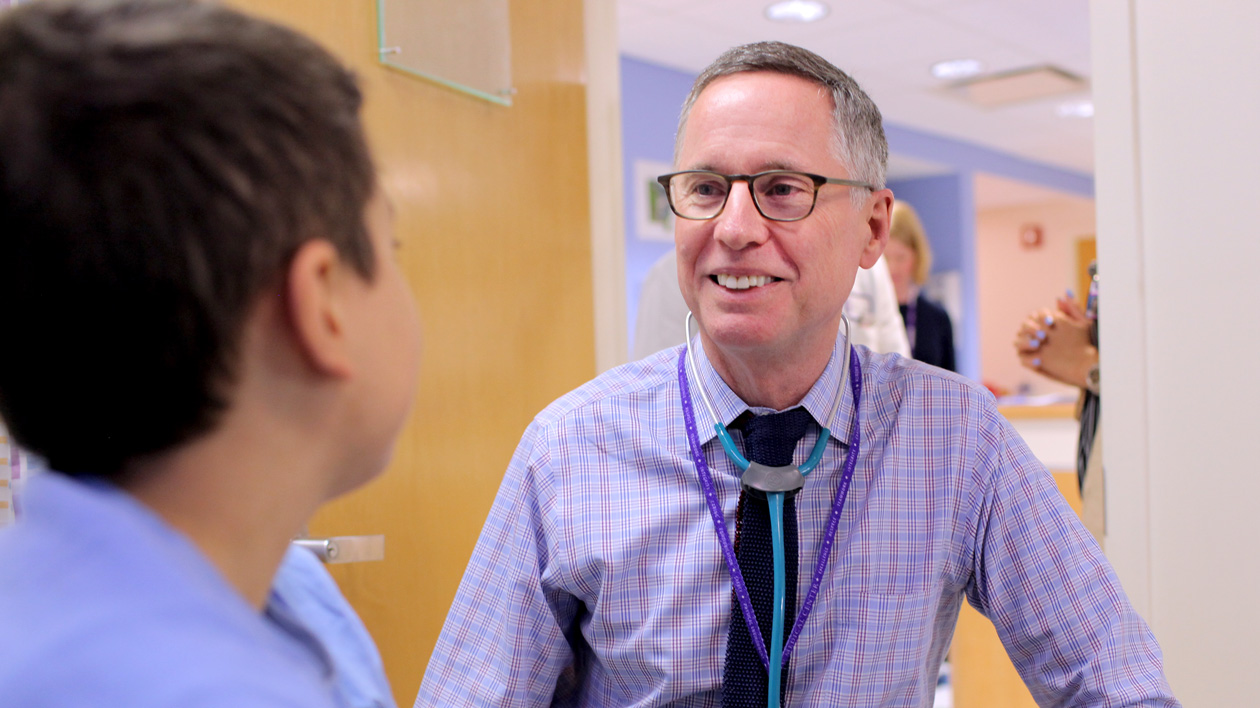Main content
We use cookies and similar tools to give you the best website experience. By using our site, you accept our Websites Privacy Policy.
Treatment for acute and chronic childhood leukemia can last for months or years. At the Stephen D. Hassenfeld Children’s Center for Cancer and Blood Disorders, part of Hassenfeld Children’s Hospital at NYU Langone, our doctors, nurses, and wellness experts begin supporting your family at your child’s very first appointment. Our approach to treating cancer is to focus not only on your child’s physical health but also on his or her psychological and social wellbeing with a strong focus on a healthy and productive future.

We offer a variety of support programs at the Stephen D. Hassenfeld Children’s Center for Cancer and Blood Disorders. These child and family support services and resilience programs are provided by Sala Institute for Child and Family Centered Care.
Wellness programs for children, their siblings, and their parents are offered daily at the Stephen D. Hassenfeld Children’s Center for Cancer and Blood Disorders. These programs include art therapy, horticulture therapy, massage, music therapy, pet therapy, psychological services, sibling support groups, teen and young adult support groups, and yoga, among others. Our social workers, therapists, and medical librarians work with families to provide information and support throughout treatment and recovery.
After treatment, our doctors closely monitor your child through regular physical exams and routine blood tests. This usually occurs every one to three months during the first year after chemotherapy treatment ends in children with acute leukemia and less often in subsequent years. Children with chronic leukemia usually have routine blood tests every two to three months.
Despite the best care, a small percentage of children with acute leukemia can experience a relapse, or a return, of the cancer. In some children with chronic leukemia, the cancer can worsen or fail to respond to the targeted cancer medications they take each day.
If a relapse does occur, your child’s doctor creates a treatment plan based on the type of leukemia, the timing of the relapse, and the location of cancer cells detected, such as in the cerebrospinal fluid or in the bone marrow.
For children with acute lymphoblastic leukemia who relapse after the initial therapy has finished, a more intensive chemotherapy plan may be used to manage the condition. The next step is sometimes stem cell transplantation for children with acute lymphoblastic leukemia who relapse early in treatment and those with acute myeloid leukemia who relapse at any time.
For some children, an experimental treatment being tested in a clinical trial may provide another option. NYU Langone is a member of the Children’s Oncology Group, a National Cancer Institute–supported organization that unites thousands of experts worldwide. This enables doctors to offer and operate clinical trials, which are scientific studies designed to test new and emerging treatments for cancer and other conditions.
Our doctors have led research into the causes of relapse in childhood leukemia and are developing new treatments. Clinical trials facilitated by the Children’s Oncology Group have led to the development of the majority of available treatments for children with acute lymphoblastic leukemia in North America.
Doctors at Hassenfeld Children’s Hospital are also founding members of Therapeutic Advances in Leukemia and Lymphoma consortium, which promotes the inclusion of new drugs in clinical trials, and the development of therapies for children with recurrent leukemia. Your doctor can help you decide if participating in a clinical trial is right for your child.
We can help you find a Hassenfeld Children’s Hospital doctor.
Call 646-929-7970
or
browse our specialists.